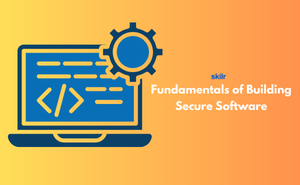👇 CELEBRATE CLOUD SECURITY DAY 👇
00
HOURS
00
MINUTES
00
SECONDS

Secure Software Fundamentals focuses on the core practices of building programs that prioritize safety and protection. Just as construction workers follow safety codes when building a house, developers follow security principles to keep applications resistant to threats. It emphasizes secure coding, spotting vulnerabilities, and designing systems with defense in mind.
Learning these principles helps professionals build strong foundations for any software project. Rather than reacting to security breaches, secure development ensures risks are minimized early. This leads to better reliability, user confidence, and long-term sustainability of digital products.
This exam is ideal for:
Domain 1 - Introduction to Secure Software
Domain 2 - Common Software Vulnerabilities
Domain 3 - Secure Coding Practices
Domain 4 - Security in the Software Development Lifecycle (SDLC)
Domain 5 - Authentication and Authorization
Domain 6 - Data Protection
Domain 7 - Secure Software Tools and Techniques
Domain 8 - Compliance and Standards
Domain 9 - Best Practices for Ongoing Security
Industry-endorsed certificates to strengthen your career profile.
Start learning immediately with digital materials, no delays.
Practice until you’re fully confident, at no additional charge.
Study anytime, anywhere, on laptop, tablet, or smartphone.
Courses and practice exams developed by qualified professionals.
Support available round the clock whenever you need help.
Easy-to-follow content with practice exams and assessments.
Join a global community of professionals advancing their skills.
Finance, healthcare, e-commerce, government, and tech companies.
Yes, encryption and data protection are key topics.
Yes, project managers and business analysts can gain awareness of risks.
Yes, it provides a stepping stone for deeper studies in security.
Secure software developer, application security engineer, QA analyst, or cybersecurity specialist.
No, it’s also valuable for testers, managers, and IT professionals.
Definitely — it builds a strong foundation for more advanced security roles.
It prevents data leaks, protects users, and builds trust.
No, basic coding knowledge is enough to start.
It means learning the basics of making applications safe from cyber threats.